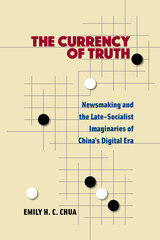
In The Currency of Truth, Emily H. C. Chua argues that news in China works less as a medium of mass communication than as a kind of currency as industry players make and use news articles to create agreements, build connections, and protect and advance their positions against one another. Looking at the ethical and professional principles that well-intentioned and civically minded journalists strive to uphold, and the challenges and doubts that they grapple with in the process, Chua brings her findings into conversation around “post-truth” news and the “crisis” of professional journalism in the West. The book encourages readers to rethink contemporary news, arguing that rather than setting out from the assumption that news works either to inform or deceive its publics, we should explore the “post-public” social and political imaginaries emerging among today’s newsmakers and remaking the terms of their practice.

In 1872 in the treaty port of Shanghai, British merchant Ernest Major founded one of the longest-lived and most successful of modern Chinese-language newspapers, the Shenbao. His publication quickly became a leading newspaper in China and won praise as a "department store of news," a "forum for intellectual discussion and moral challenge," and an "independent mouthpiece of the public voice." Located in the International Settlement of Shanghai, it was free of government regulation. Paradoxically, in a country where the government monopolized the public sphere, it became one of the world's most independent newspapers.
As a private venture, the Shenbao was free of the ideologies that constrained missionary papers published in China during the nineteenth century. But it also lacked the subsidies that allowed these papers to survive without a large readership. As a purely commercial venture, the foreign-managed Shenbao depended on the acceptance of educated Chinese, who would write for it, read it, and buy it. This book sets out to analyze how the managers of the Shenbao made their alien product acceptable to Chinese readers and how foreign-style newspapers became alternative modes of communication acknowledged as a powerful part of the Chinese public sphere within a few years. In short, it describes how the foreign Shenbao became a "newspaper for China."
READERS
Browse our collection.
PUBLISHERS
See BiblioVault's publisher services.
STUDENT SERVICES
Files for college accessibility offices.
UChicago Accessibility Resources
home | accessibility | search | about | contact us
BiblioVault ® 2001 - 2024
The University of Chicago Press









